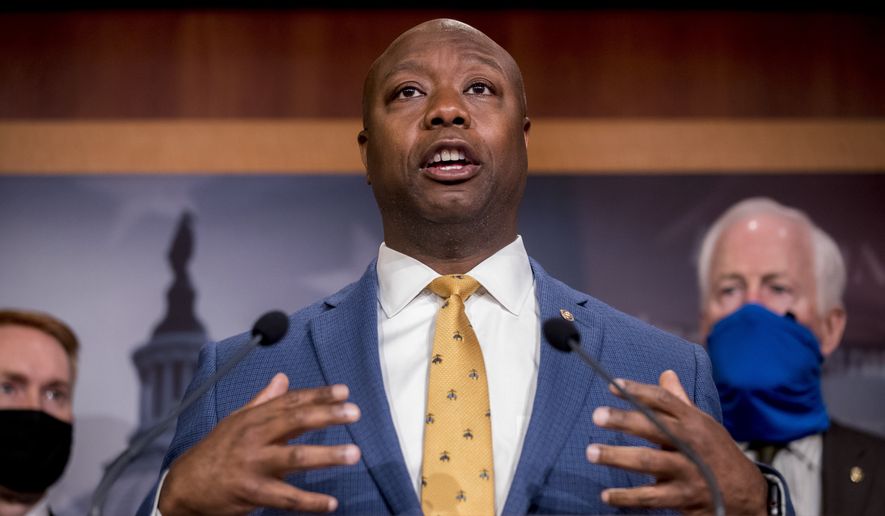Sen. Tim Scott on Sunday defended his police overhaul legislation that is set for a test vote this week, saying Senate Republicans are respecting the Constitution by not running over state rights and instead using federal funds as an incentive to change the country’s police departments.
Republicans across the board in Washington and most Democrats on Capitol Hill have staunchly denounced the calls from certain activist groups like Black Lives Matter to radically restructure or end policing in local communities by defunding or abolishing police departments.
However, The Root, a liberal-leaning black-oriented media outlet, published an article Friday arguing that the GOP’s emphasis on manipulating police access to federal funds is essentially the same mechanism as those advocating for “defund the police” movements.
Mr. Scott, one of only three black lawmakers in the 100-member Senate, thanked The Root for finding common ground, but pointed out Republicans are trying to manipulate resources but also provide more funds in areas that they need.
“I’m not sure I would go along with their conclusion,” Mr. Scott, South Carolina Republican, said on ABC’s “This Week.” “But, yes, it’s important for us to use federal resources we use for law enforcement in a way to compel them towards the direction that we think is the best interest of the nation.”
The package ramps up requirements for police departments to report on use of force and “no-knock” warrants and provides incentives for chokehold bans. It provides grants for training resources and body cameras, with penalties for improper use of the recording devices, filing false police reports, or serious bodily injuries that lead to prosecution. It also establishes commissions and invests in data collection to target new policies and where funds can be used.
Republicans have stayed away from implementing national mandates on policies, saying House Democrats’ approach is too heavy-handed. One key example is in how each side approaches chokeholds, which lawmakers across the board want to reign in.
Both Democrats and Republicans tie chokeholds to federal funds — but the House bill will only allow access if the practice is banned while the Senate bill conditions it on “severely restricting” the practice with exceptions to protect the life of an officer.
“We both know that you can’t ban the use of chokeholds … except to compel behavior by the federal grants that come into play. And by removing those grants you actually position those departments to change their positions,” Mr. Scott said.
“The U.S. Constitution does not allow the federal government to take over local police departments,” he added.
The Democrats’ package goes further than what many Republicans have said is acceptable by proposing a national use of force standard, creating a national misconduct registry, and opening up officers to civil lawsuits for actions resulting from carrying out their duties by limiting qualified immunity.
Democrats already have the votes to pass their bill as-is out of the House this week, and House Speaker Nancy Pelosi said she’d like the two competing bills to go to conference where a bicameral committee can hash out a deal.
This gives Senate Minority Leader Charles E. Schumer a delicate choice on whether to block a procedural vote this week to allow the GOP bill to move to the floor.
“Our Democratic friends, if they want to make a law — and not just try to make a point — I hope they will join us in getting on the bill and trying to move forward,” Senate Majority Leader Mitch McConnell, Kentucky Republican, said when the bill was introduced last week.
Democratic strategists Brad Bannon and Jim Manley both told The Washington Times if GOP blocks substantial negotiations, the political blowback will be on them.
However, Mr. Manley said it makes sense for the Democrats to allow the procedural vote to pass and reserve their ability to cause a political ruckus for the passage or conference stage if their amendments are shut down.
• Gabriella Muñoz can be reached at gmunoz@washingtontimes.com.




Please read our comment policy before commenting.